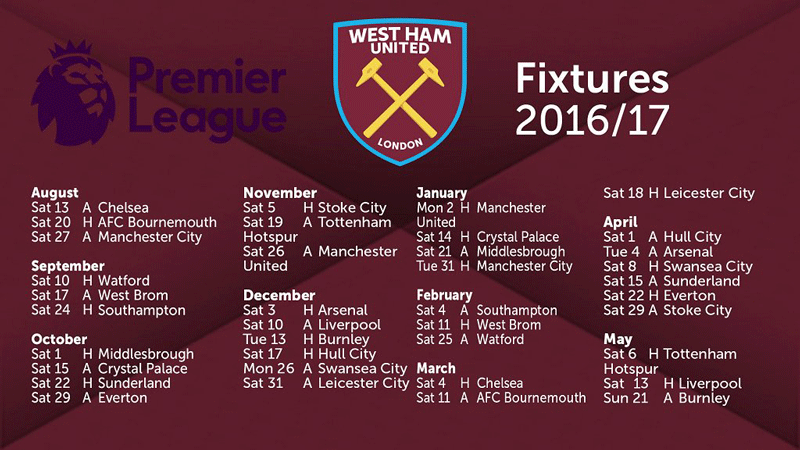
In modern times in the Premier League era, fixtures divide very neatly into two halves of the season. What I mean by this is that we play games against each of the other nineteen teams in the league in the first half of the season, which concludes very neatly on 31 December, and then play them all again between January and May. As there are twenty teams, we play nineteen matches in each half.
From August to December our nineteen games comprise nine at home and ten away. The situation is reversed in the second half with ten at home and nine away. All very logical you might think, but this has not always been the case.
My support of West Ham goes back almost sixty years, and in the first season that I remember (1958-59), our second league game of the season on 25 August was at home to the previous season’s champions, Wolves. Then our fourth game was a visit to Wolves on September 3. So, just four games into the season and we had played our quota of games against the best side in the country. Incidentally we won at home and drew away. In 1964-65 a similar situation arose when we played Manchester United at home and away on August 24 and September 2.
So, in those days there was no real balance to the season, and the league table could therefore be potentially misleading if you fulfilled all your fixtures against the top clubs early on. I’m not sure when exactly this was rectified, but the current situation of playing all nineteen teams once, before playing them all again would seem to be fairer.
If we look at this season in detail then our nine home games in 2016 are against Bournemouth (16), Watford (13), Southampton (6), Middlesbrough (P), Sunderland (17), Stoke (9), Arsenal (2), Burnley (P) and Hull (P). The figures in brackets denote last season’s league position, plus “P” for the promoted clubs. That is just three teams who finished in the top half, three in the bottom half, and all three promoted teams. On paper you would have to conclude that our home games in the first half of the season should yield a substantial points total.
Conversely the ten away games in 2016 are against Chelsea (10), Man City (4), WBA (14), Palace (15), Everton (11), Tottenham (3), Man United (5), Liverpool (8), Swansea (12), and Leicester (1). Eight of the ten games are against teams that finished in the top twelve in the league. On paper, the conclusion we can draw from this, is that it is a very tough set of away fixtures in the first half of the season.
Of course, the situation is reversed in 2017, so that in the second half of the season we have easier away games and tougher home fixtures (on paper). I’m not sure how randomly the fixtures computer allocates fixtures, but there is certainly an imbalance in the apparent strength of our opponents in our home and away fixtures in the two halves of the season. For that reason perhaps we should not take too much notice of the league table until we are a long way into the season.
Surely it wouldn’t take too much computer programming skill to ensure a much more balanced fixture list. The fixtures computer should come up with an end result such that in each half of the season we play roughly half of our home games against teams that finished in the top half in the previous season, and half against teams from the bottom half. The same should be true of the spread of away fixtures.
This would be fairer to all teams, both top and bottom, and would ensure that the league table is more representative of the strength of clubs throughout the season, and give an indication of finishing positions much sooner. As it stands, teams with tough early fixtures could find themselves in a relegation dogfight early on in the season, which then inhibits the way that they play for the remainder.
So does this explain why we sit in seventeenth place after ten games of the season? No. It may be a partial factor, but we are there because of poor defending, plus the fact that we are as weak as I can remember at scoring goals. We have only found the net ten times in ten games, and conceded nineteen at the other end. Only Sunderland and Hull have conceded more goals than we have, and have poorer goal difference statistics.
Over a whole season an average of one goal a game would give us just 38 goals. In the last twenty-five years we’ve only managed such a poor scoring record twice. In one of those seasons we were relegated, and in the other we escaped relegation on the last day of the season. And conceding 19 goals in ten games or 1.9 goals a game would equate to 72 in 38 games. When did we last concede that many goals or more in a season? Fifty years ago in 1966-67. But in that year we scored eighty!
